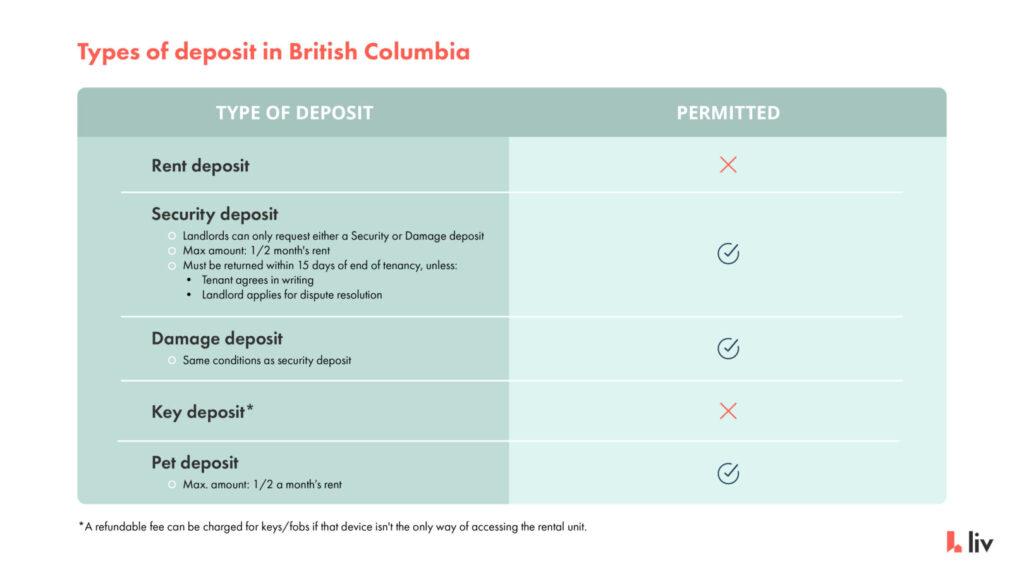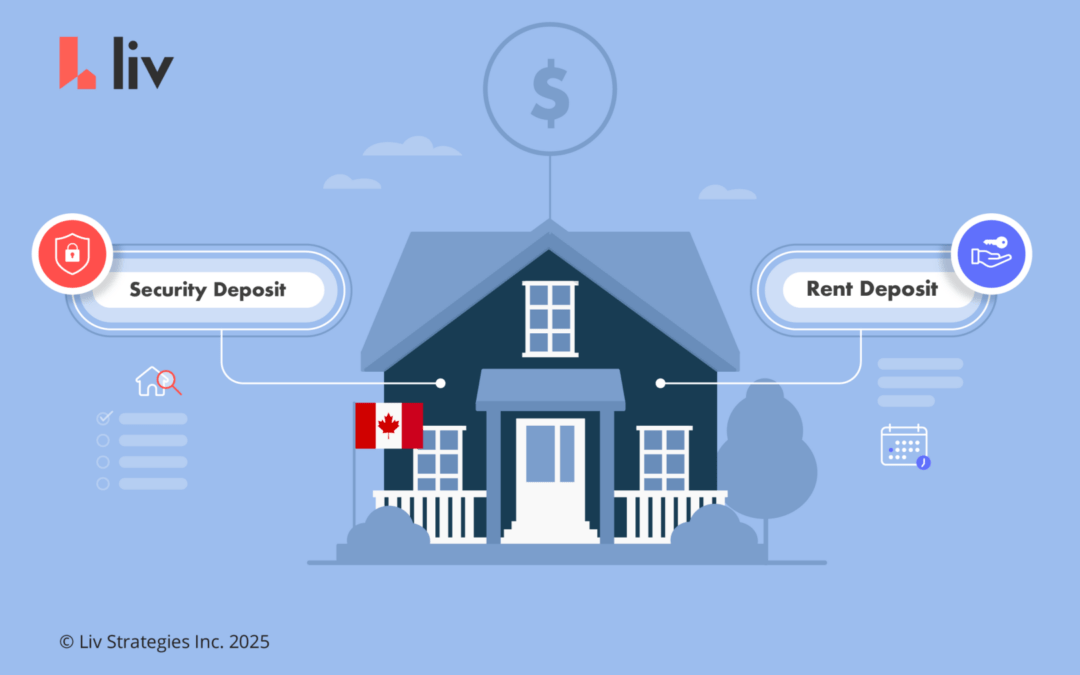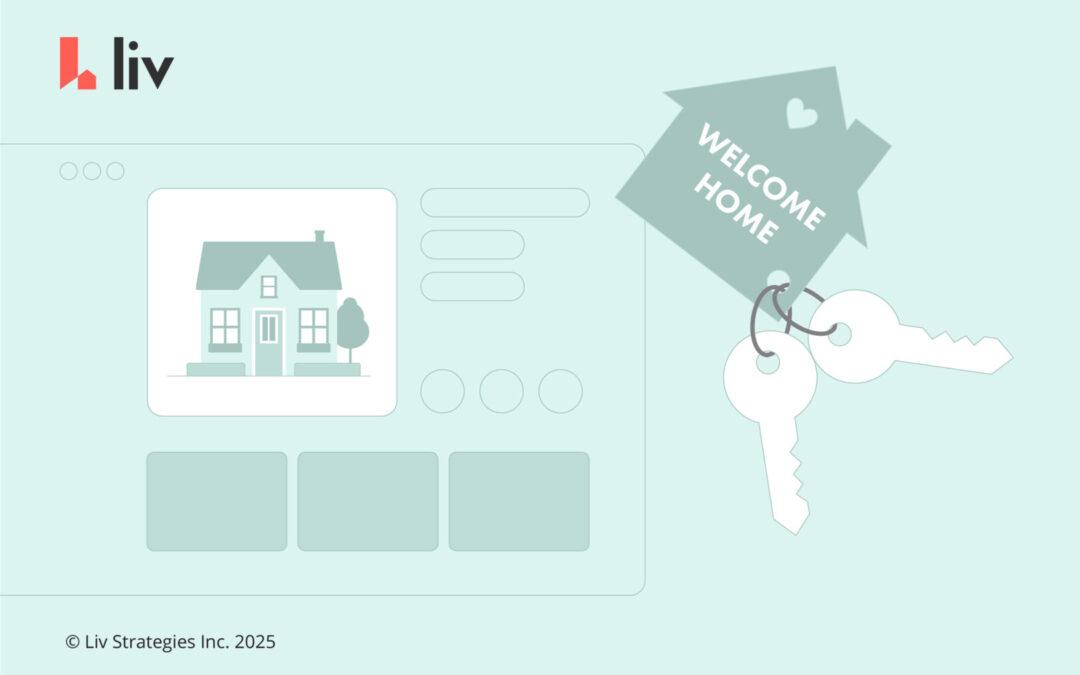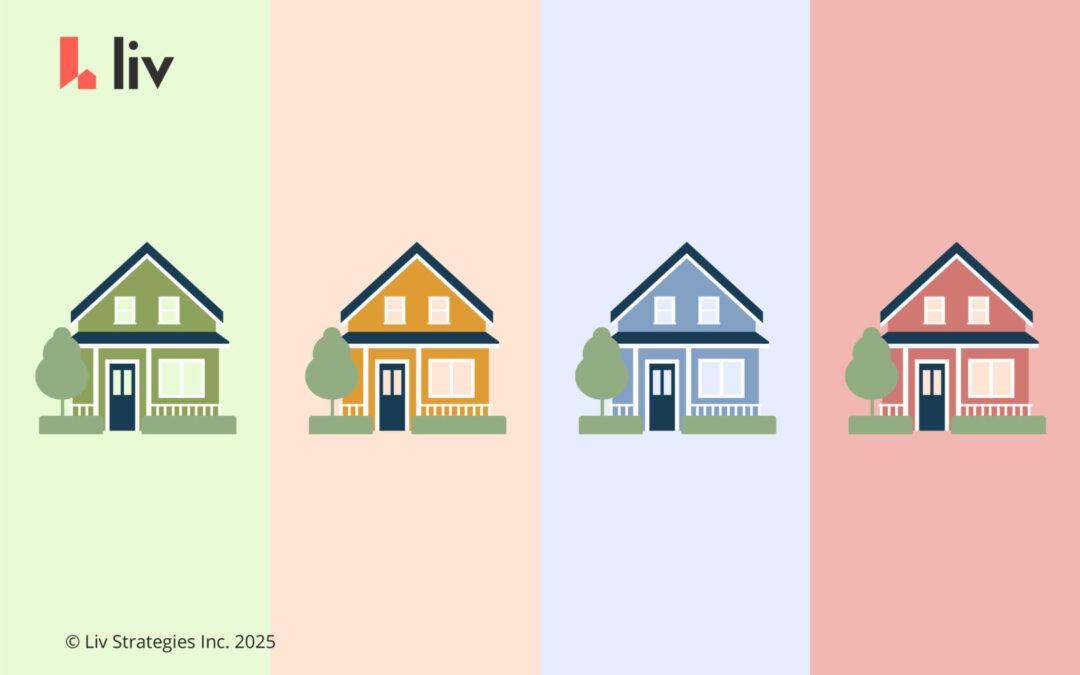There are tons of specific rules governing how landlords and tenants should collect & pay their security or damage deposit in BC. For both landlords and tenants, familiarizing yourself with the types of deposits that are permitted, maximum amounts, and guidelines for their return is key to avoiding disputes at the conclusion of your tenancy. Like any province, B.C. has clearly laid out how these deposits are to be collected and returned, but finding and understanding this information isn’t always easy. Here, liv.rent will be breaking down all the need-to-know information about rent deposits in B.C. to help you make sense of how they function, including a detailed FAQ section with answers to all your pressing questions.
What is a Damage Deposit BC?
A damage deposit in British Columbia (BC), Canada, is a security deposit that a landlord collects from a tenant at the beginning of a tenancy. It’s intended to cover the cost of repairing damage beyond normal wear and tear that may occur during the tenant’s stay.
What types of deposits are permitted in BC?

Landlords in BC can require a tenant to pay:
a security deposit equivalent to one-half of one month’s rent; and
if they have a pet, a pet deposit equivalent to one-half of a month’s rent (so a full month’s rent in the case of pet-owning tenant)
Tenants must pay the security deposit within 30 days of entering into the tenancy agreement or the pet damage deposit within 30 days of when it’s required.
Damage Deposit Rules BC: What Landlords and Tenants Need to Know
For Tenants:
You can be asked to pay a damage deposit up to half a month’s rent.
If you have a pet, a pet damage deposit (also up to half a month’s rent) may be required.
You must pay the deposit within 30 days of signing the tenancy agreement.
Keep a receipt or proof of payment.
The deposit is refundable, minus any deductions for damage beyond normal wear and tear.
You have the right to a move-in and move-out inspection with the landlord.
The landlord must return the deposit within 15 days after tenancy ends and you provide a forwarding address.
For Landlords:
You can only collect a damage deposit up to half a month’s rent and a separate pet damage deposit if applicable.
You must provide a receipt for the deposit.
Conduct move-in and move-out inspections using the official RTB forms.
The deposit must be kept separate from personal funds and returned promptly.
You can only keep the deposit to cover damage beyond normal wear and tear or unpaid rent (with tenant agreement or RTB order).
You must return the deposit (or balance) within 15 days of tenancy ending and receiving the tenant’s forwarding address.
Accuracy Check Against TenantBC/RTB Guidelines
| Topic | Status | Notes |
| Deposit Limit | ✅ | Max ½ month’s rent; same for pet deposit. Confirmed by RTB. |
| Payment Deadline | ✅ | Tenant must pay within 30 days of tenancy agreement. |
| Inspections | ✅ | Move-in & move-out inspections are mandatory and must be documented. |
| Return Deadline | ✅ | 15 days after tenancy ends and forwarding address is given. |
| Use of Deposit | ✅ | Can only cover damage beyond wear & tear, not rent or basic cleaning. |
| Dispute Process | ✅ | RTB handles disputes; landlords need written tenant consent or a dispute resolution decision to keep deposit. |
| Forwarding Address Requirement | ✅ | Must be in writing for deposit to be returned. |
Official Sources
The guidelines match with what’s published by:
Residential Tenancy Branch (RTB): https://www.gov.bc.ca/landlordtenant
TenantBC and other BC tenant advocacy groups who follow RTB regulations.
Residential Tenancy Act about Damage Deposit in BC
Key Rules from the Residential Tenancy Act
1. Deposit Limit: A damage deposit cannot exceed half a month’s rent. If the tenant has a pet, the landlord may also collect a pet damage deposit, also capped at half a month’s rent.
2. Payment Deadline: The tenant must pay the deposit within 30 days of signing the tenancy agreement. If the tenant fails to pay, the landlord can issue a Notice to End Tenancy.
3. Condition Inspections: Landlords and tenants must complete move-in and move-out condition inspection reports using the prescribed RTB form. These inspections help determine if there’s any damage beyond normal wear and tear.
4. Deposit Return Timeline: The landlord must return the deposit within 15 days of the tenancy ending and receiving the tenant’s written forwarding address.
5. When a Landlord Can Keep the Deposit: Only if:
The tenant agrees in writing, or
The landlord gets a dispute resolution order from the Residential Tenancy Branch.
6. Deposit Cannot Cover:
– Normal wear and tear (e.g., faded paint, worn flooring).
– Unpaid rent, unless specifically approved through proper legal process.
– Penalties for Not Following the Law
– If the landlord does not conduct the inspections, they may lose the right to keep any part of the deposit.
– If the tenant refuses to participate, they may lose the right to get the deposit back.
📎 Reference Sections of the RTA:
Section 19: Security deposit limits.
Section 24: Condition inspection requirements.
Section 38: Return of security and pet damage deposits.
Section 36: Forwarding address requirement.
Section 40: Dispute resolution for deposits.
Can landlords ask for first and last month’s rent in BC?
Landlords in B.C. are not able to request first and last month’s rent upfront, as they would be in Ontario and other provinces. B.C. has its own rules when it comes to how much money landlords can collect at the beginning of the tenancy, as well as when and how that money can be kept and used.
In the province, the maximum a landlord or property manager can collect at the beginning of a tenancy is the equivalent of half a month’s rent as a security/damage deposit, and another half a month’s rent as a pet damage deposit, if applicable. Once these deposits are accepted, the tenancy is generally considered to have begun. First month’s rent is typically paid on the first day of the tenancy.
What types of deposits are permitted in BC?
Landlords in BC can require a tenant to pay:
- a security deposit equivalent to one-half of one month’s rent; and
- if they have a pet, a pet deposit equivalent to one-half of a month’s rent (so a full month’s rent in the case of pet-owning tenant)
Tenants must pay the security deposit within 30 days of entering into the tenancy agreement or the pet damage deposit within 30 days of when it’s required.
Is a damage deposit legal in BC?
A security or damage deposit is legal in B.C. so long as it is equal to no more than half of the first month’s rent. So long as there is no damage to the unit, and the landlord doesn’t seek dispute resolution to withhold part or all of the deposit, the full damage deposit must be returned under B.C. tenancy law.
Is a pet damage deposit legal in BC?
Landlords may also request a pet damage deposit, also referred to as simply a pet deposit, on top of the security or damage deposit. This can either be collected at the start of the tenancy, at the time of signing a lease, or during the tenancy if the tenants get a pet with the landlord’s consent.
Like a security or damage deposit in BC, the pet deposit can equal a maximum of half a month’s rent. Service or guide dogs are also exempt from this type of deposit. As well, this amount can only be used to cover the costs of damages associated with pets, unless the tenant agrees in writing or an arbitrator permits it.
Paying and Collecting the Damage Deposit BC
For Tenants – Paying the Deposit
Amount: You are only required to pay up to half a month’s rent as a damage deposit.
Pet Deposit: If you have a pet, you may also need to pay a separate pet damage deposit, also limited to half a month’s rent.
When to Pay: You must pay the deposit within 30 days of signing the tenancy agreement.
Receipt: Always ask for a written receipt, or keep a record if paying electronically (e-transfer, etc.).
Required to Secure the Tenancy: Not paying on time may result in the landlord ending the tenancy with proper notice.
For Landlords – Collecting the Deposit
Deposit Limit: You can collect a maximum of half a month’s rent as a damage deposit.
You may also collect a separate pet damage deposit if the tenant has a pet (also up to half a month’s rent).
Timing: Request the deposit at the time of signing the tenancy agreement. The tenant has 30 days to pay it.
Receipts: You must provide a written receipt unless the tenant has clear proof of payment.
No Overcharging: Collecting more than the legal limit (e.g., a full month’s rent or combined deposits above 1 month) violates the Residential Tenancy Act.
Damage Deposit Rules in BC: Landlords
1. Maximum Amount
You may collect a damage deposit up to half a month’s rent. If the tenant has a pet, you can also collect a pet damage deposit, also capped at half a month’s rent.
2. Collection Timeline
You must request the deposit at the time of signing the tenancy agreement. The tenant must pay the deposit within 30 days.
3. Provide a Receipt
You must give the tenant a written receipt, unless the tenant already has proof (e.g., e-transfer record).
4. Complete Condition Inspections
You must do move-in and move-out inspections with the tenant. Use the official RTB Condition Inspection Report form.
Failing to do this may result in losing your right to claim the deposit.
5. Deposit Return Rules
You must return the deposit within 15 days of: The end of tenancy, and Receiving the tenant’s written forwarding address.
6. When You Can Keep It
You can only keep all or part of the deposit if:
The tenant agrees in writing, or You obtain a dispute resolution order from the RTB.
7. Wear and Tear is Not Deductible
You cannot deduct for normal wear and tear (e.g., faded paint, worn carpet).
8. No Non-Refundable Deposits
You cannot charge any non-refundable “cleaning” or “damage” fees outside the legal deposit limits.
Can landlords collect a key deposit in BC?
Unlike in Ontario, B.C. landlords cannot collect a key deposit at the start of the tenancy, provided that the key or fob is the tenants’ only means of accessing the rental property. If there is another way to enter the rental unit, the landlord may collect a deposit for keys, fobs, or related devices provided that the fee is refunded in full once the device is returned.
Join Our Newsletter
For more info on rental laws and policies (e.g. eviction, lease agreements, repairs & maintenance), subscribe to get the latest news.
When should the security deposit be returned to tenants?
Once a tenancy ends, and the tenant provides their landlord with a forwarding address within one year of the end of tenancy, the landlord will have 15 days to:
- return all deposits to the tenant plus any interest unless you:
- receive permission in writing from the tenant who agrees to allow you to keep some or all of the deposit; or
- apply for dispute resolution with the Residential Tenancy Branch asking to keep all or some of the deposit.
If you do not act within the 15 days, tenants can apply for dispute resolution to have the deposit returned. In this case, landlords could be ordered to pay the tenant twice the amount of their deposit.
What if damages exceed the amount of the security deposit?
If damages exceed the security deposit in BC, the tenant is still responsible for the full amount. The landlord can apply to the Residential Tenancy Branch (RTB) for a monetary order to recover the extra cost. This must be done within 2 years. The landlord must still return any unused portion of the deposit or file a dispute within 15 days of receiving the tenant’s forwarding address. Proper documentation (photos, inspection reports, receipts) is essential.
Example: If the deposit is $750, and damage costs $1,200:
You can apply to keep the $750 with tenant’s agreement or RTB approval. You must apply to the RTB to recover the additional $450.
Do landlords have to pay interest on a damage deposit?
Yes. B.C.’s tenancy laws require landlords to pay a percentage of interest when returning deposits to their tenants following the conclusion of the tenancy. For 2023, this amount is 1.95%.
This applies to both security/damage deposits, as well as pet deposits. For more information on how and when this amount is to be paid, consult this resource on returning deposits.
When can landlords keep the security deposit?
In the case of damage to the rental property, landlords may withhold part or all of the security deposit. This involves either having the tenant agree in writing that they were responsible for the damage, or applying for dispute resolution, in which landlords will need to provide the proper forms to your tenant.
Landlords will also need to have evidence proving their claim. It’s always wise to complete a thorough Condition Inspection Report from the beginning and end of the tenancy along with photos and other relevant items that may support their claim (i.e. witness statements, repair receipts, etc.)
The landlord’s claim should include evidence such as oral testimony, photos, witness statements, receipts, or other evidence (including a copy of the condition inspection report(s).* Together, this information should provide some proof that:
- the landlord suffered a loss;
- the tenant caused the damage or loss;
- the value of the items that were damaged or the amount of the landlord’s loss; and
- you took reasonable steps to minimize your losses (such as protecting your property from further damage when you realized it was happening).
Typically, these hearings are conducted by telephone. Once an application has been received and paid for, landlords will receive a package in the mail outlining their claim and hearing details and a request for an application fee. They’re advised to follow the instructions closely, pay the fee and then wait to be granted a hearing date (assigned once the application fee is received).
* NOTE: A landlord may lose the right to claim against the deposit for damage to the rental unit if the landlord does not provide the tenant with at least two opportunities to participate in the condition inspection at the start and end of the tenancy and provide a copy of the completed report to the tenant, as required. A tenant may lose the right to the return of the deposit if the tenant does not participate in the condition inspection of the rental unit at the start and end of the tenancy.
Increasing Damage Deposits with Rent Increases in BC Can a landlord increase the damage deposit when rent increases?
No, not automatically.
But there’s one exception:
If the rent increases and the original damage deposit was less than half a month’s rent, the landlord can ask to top up the deposit to reach that maximum. When rent goes up in BC, landlords can only ask to increase the damage deposit if it’s less than half a month’s rent. They can ask the tenant to pay the difference to match the new rent’s half-month amount. They must give 30 days’ written notice for this.
What if damages exceed the amount of the security deposit?
The first step is for landlords to ask the tenant to pay for the damages or have them pay for the repairs. This includes damages beyond reasonable wear and tear and damage they or their guests or pets caused. If the tenant refuses, the process is the same as keeping deposits. You can apply for dispute resolution (Landlord’s Application for Dispute Resolution) with the Residential Tenancy Branch requesting the tenant pay money for the damage. You should submit evidence with your application in support of the value of the compensation claimed.
Landlords maintain the right to claim compensation even after the tenancy ends, for up to two years after the conclusion of the tenancy. The tenant can make a separate claim even if it falls outside of the two year period just as long as they do so prior to the first claim being heard.
How to avoid deposit disputes
Of course, the best way to avoid issues around returning or withholding deposits is to be an active landlord and avoid damages in the first place. This means:
- Conduct regular visits to the premise twice a year is typically sufficient though quarterly is acceptable too. This will enable you to nip the problem in the bud and issue evacuation orders if the state of the premises warrants this. During these inspections, you will notice if wear and tear is harder than normal, extra people residing on the premises or signs of pets, for example.
- Be aware of your responsibilities and your tenant’s in terms of property repairs and maintenance.
- Ask to conduct an extra inspection on the month before the tenant is set to move out. This will enable you to gauge the state of the situation and file an application to the Residential Tenancy Branch to hold the deposit if you note significant damages.
- Screen your tenants thoroughly. Thankfully, liv.rent does this for you by verifying all prospective tenants – asking them to provide the right information, conducting credit & background checks and verifying social media accounts to generate a “Trust Score” and ensure all applicants using the platform are credible and reliable.
FAQ: How to pay & collect a security or damage deposit in BC
How much is a damage deposit in BC?
A security or damage deposit must be equal to no more than half a month’s rent under BC tenancy law.
What can a damage deposit be used for in BC?
If a landlord decides to withhold part or all of a damage deposit in BC, that amount must only be used to repair damages caused by the tenant that go beyond reasonable wear & tear.
For more information on differentiating wear & tear from damage, you can consult this resource.
Are deposits refundable in BC?
Provided tenants don’t cause any damage to the rental property during the course of their tenancy, security and damage deposits should be refunded in full. The same goes for pet damage deposits as well.
For more detailed information on how damage deposits are collected and refunded in BC, you can find detailed guidelines from the provincial government here.
Must a landlord provide a receipt for a security deposit?
There is no law mandating that landlords must provide a receipt upon collecting a security or damage deposit in BC, however, it should be documented in the lease in case of a dispute later on.
It’s also advised that both tenants and landlords keep their own evidence of paying or receiving a damage deposit in the event of a disagreement between the two parties.
What to do if a landlord doesn't return my security deposit?
If a tenant has provided their landlord with a forwarding address within one year of the end of the tenancy, and the landlord hasn’t returned their deposit or sought dispute resolution within 15 days of this information being given, a tenant can apply for dispute resolution on their end.
Tenants should try discussing the issue with their landlord or property manager first though, as the dispute resolution process can be complicated and time-consuming.
When do tenants pay a security deposit?
In BC, tenants typically pay a security or damage deposit at the time of signing a lease. Regardless of whether a lease is signed though, the tenancy is generally considered to have begun once the deposit is received.
Furthermore, tenants must pay the security/damage deposit in full within 30 days of the tenancy’s start date, or else the landlord may serve a one month notice to end tenancy.
Does wear and tear come out of a deposit?
Landlords are not permitted to withhold any portion of a security or damage deposit to cover repairs for normal wear & tear to the rental unit. Tenants are only responsible for covering the costs of any significant damage they cause to the rental unit during their tenancy.
What is the difference between a security and damage deposit?
At least in BC, the terms ‘security deposit’ and ‘damage deposit’ tend to be used interchangeably. Both denote an amount that is paid at the beginning of tenancy and withheld until the end, that can be used only to cover any signficant damage caused to the rental unit.
How can I get help with a deposit dispute?
1. At first, try to Resolve It Directly. Talk to your landlord or tenant first to try to reach an agreement.
2. Contact the Residential Tenancy Branch (RTB)
The RTB offers information and mediation services to help resolve disputes.
3. Apply for Dispute Resolution
If you can’t agree, either party can apply to the RTB for a Dispute Resolution Hearing.
You can make a claim to get your deposit back or ask for money owed for damages.
4. Prepare Your Evidence
Bring documents like:
The tenancy agreement
Condition inspection reports
Photos/videos of damage
Receipts for repairs
Communication records
5. Follow the RTB Decision
The RTB decision is legally binding. If the losing party doesn’t comply, the winner can enforce it through court.

Rethink The Way You Rent
Not on liv.rent yet? Experience the ease of digital applications & contracts, verified tenants & landlords, virtual tours and more – all on one platform. Sign up for free or download the app.
Subscribe to receive the latest tenant & landlord tips and get notified about changes in the Canadian rental market.
>> Stay up-to-date on the average rent in Vancouver, Toronto and Montreal: Rent Reports.




0 Comments